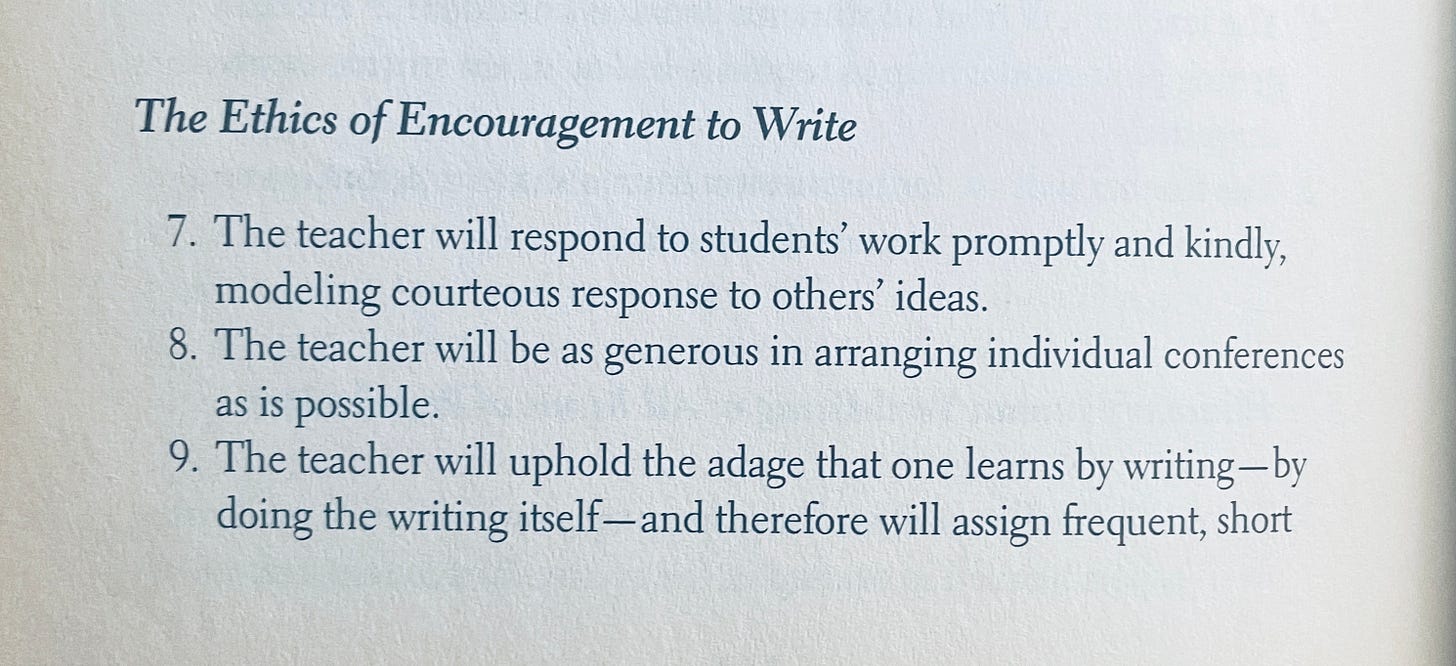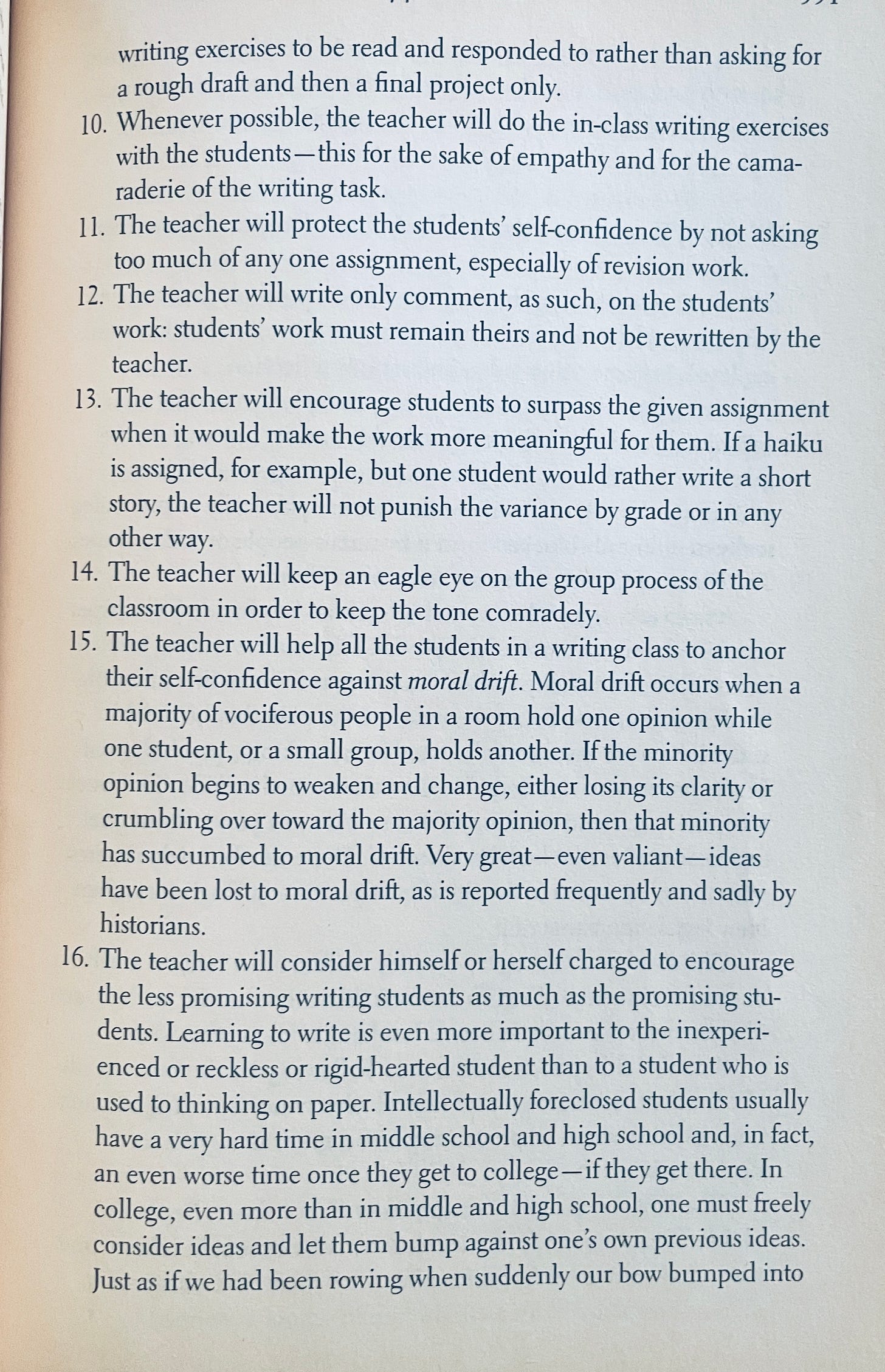Writing Problems: How to Respond in Workshops
The ornery fiction writer Charles Newman said to me at the end of the last century: “The workshop represents everything wrong with the 20th century!”
Gerald Stern went further:
Still, the workshop represents an essential way to get feedback on poems from like-minded, simpatico peers. On the other hand, so many people have crappy workshop experiences, because readers of poetry fall into two broad groups:
People who know what they’re talking about.
People who don’t know what they’re talking about.
Furthermore, knowing how to write poems doesn’t mean that someone knows how to teach how to write poems. Often the technical part of making a poem can be taught, but how to find the poem is another matter.
What are some bad ways to respond in workshop and what are some better ways?
Bad:
“This poem has cats in it, and I don’t like cats.”
“This poem should do X, Y, or Z to make a kind of poem that I like.”
“This poem is/isn’t the kind of style of poem I’m interested in.”
“The poet and the speaker are definitely the same speaker and here are my judgments about that.”
“I like this.”
“I don’t like this.”
“I follow X, Y, or Z religion, and the content here is beyond my experience.”
“I like style X, and this poem is style Y.”
“This poem has references and allusions to something I don’t know, but I don’t want to look it up even though I have a supercomputer in my pocket 14 hours a day.”
“This poem isn’t immediately understandable like the McPoems I’m used to.”
“I’m confusing subject matter with craft issues.”
“I thought it flowed well.”
“I thought it didn’t flow well.”
“I thought the tone was good.”
“I take refuge in the idea of ‘irony', and this poem is sincere.”
“This poem doesn’t show loyalty to X, Y, or Z norm.”
Better:
“This poem does/doesn’t match the poet’s intentions.”
“This part in the syntax is muddy because of X, Y, or Z.”
“There are too many adjectives/adverbs.”
“These pronouns are unclear.”
“That is a mixed metaphor.”
“The end is too much summary/paraphrase.”
“End with an image and don’t explain.”
“Change what’s there by using the same words, but alter the syntax.”
“Drop a weak verb.”
“Leave the sentence open with a chance for a stronger verb.”
“The source of your annoyance is that you have not yet found the word you need.”
“End more than half the lines and more than 2/3 of the sentences with one-syllable words and words with strong beats.”
“Don’t use the same subject in two consecutive sentences.”
“Watch for ‘to be’ verbs.”
“Make each sentence four words longer or shorter than the one preceding it.”
“Watch for prepositions—which are anywhere a cat can go.”
“The poem starts too early.”
“Move the last line to the beginning.”
“There is precedent for this poem in examples X, Y, and Z.”
Workshops can be productive if they are framed as a horizontal, non-hierarchical culture of care. They can be destructive, however, if they are framed as low-level sadism, where the poet is not allowed to speak and the other participants are just there to criticize.
Any poem can be made better. The purpose of a workshop is not to learn how to write better, but how to read and think better. The goal is to make improvements, and then improve those improvements.
In 1987, Carol Bly and Brenda Robertson wrote an Ethics Code for Teaching Creative Writing. It was intended for Middle and High School students, but it’s useful for any creative writing workshop. These are some of their most important ethical codes:
Many people in a workshop expect (or have been trained to expect) that they need to approach the workshop setting with fear. This is because many bullies have taught workshops—slothful teachers of creative writing won’t give students what they need most. Students need a model of how to live a life connected to writing and reading poetry. They need psychological sturdiness, and enough compassionate imagination to survive in a sick world.
For further reading:
Bly, Carol. Beyond the Writers' Workshop: New Ways to Write Creative Nonfiction. New York: Anchor Books, 2011. [Buy at Bookshop]
It was brought to my attention that my Sharpener installment on Canadian poets did not have representation from Canada’s Francophone poetry and poets. As a non-French speaker, I welcome reader recommendations of French Canadian poetry in quality translation for potential inclusion in future Sharpeners.
About Sean Singer






Shortly before I went into my MFA program, a wise friend of mine said "If you're sitting in a 10-15 person workshop and you have one or two people who really seem to be helpful, who really get what you're doing, that's a fantastic workshop." Of course, if you followed all of the suggestions given on any single poem in a workshop, it would, essentially, disappear. I think the idea of "moral drift" is a remarkable one, and that your last paragraph is maybe the best thing in this post.
This article so perfectly lists helpful and unhelpful ways to respond to poems, and the ethics for creative writing teachers are brilliant, evoking compassion with rigor, and despising laziness, which often is cruel in workshops, simplifying student working not working to see the poetry in it. Thank you for this.